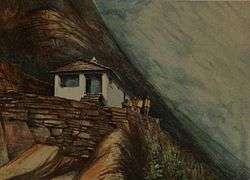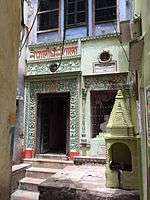Dharamshala (type of building)

A dharamshala, also written as dharmashala (Hindi: धर्मशाला dharmaśālā) is a Hindu religious resthouse.[1] In Shanskrit, Dharma means religion, and shala means "sanctuary" [2] hence dharamshala is a 'religious sanctuary' or rest-house for pilgrims, that is primarily created for religious pilgrims or as a religious endowment.
Creating dharmashala a tradition common in Hinduism, Jainism and also Tibetan Buddhism.[3] Just as sarai are for travellers and caravans, dharamshalas are specifically meant for religious travellers and built at pilgrimage sites.
Community-specific dharamshala
Sometimes a dharmaśālā is built at religious pilgrimages for a specific community, caste, ethnic group, profession or persons from a specific region. The specified pilgrims are generally charged minimal or allowed free stay for a limited duration at a dharamshala specifically built for them but other pilgrims may be charged higher amounts.
Etymology
Dharamshala (Devanagari: धर्मशाला; ITRANS: Dharmashaalaa; IAST: Dharmaśālā) is a word (derived from Sanskrit) that is a compound of dharma (धर्म) and shālā (शाला). A loose translation into English would be 'spiritual dwelling' or, more loosely, 'sanctuary'. Rendering a precise literal translation into English is problematic due to the vast and conceptually rich semantic field of the word dharma,[4] and the cultural aspect of India.
In common Hindu usage, the word dharamshala refers to a shelter or rest house for spiritual pilgrims. Traditionally, such dharamshalas (pilgrims' rest houses) were commonly constructed near pilgrimage destinations (which were often located in remote areas) to give visitors a place to sleep for the night.
Transcription and pronunciation
Due to a lack of uniform observance of transliteration and transcription conventions for Hindi (and the Devanagari script in which Hindi is written), the name of the town has been transcribed into English (and other languages using Romanic scripts) variously as Dharamshala, Dharamsala and, less frequently, Dharmshala and Dharmsala.[5] These four permutations result from two variables: the transcription of the word धर्म (dharma)—particularly the second syllable (र्म)—and that of the third syllable (शा).
A strict transliteration of धर्म as written would be 'dharma' [ˈdʱərma]. In the modern spoken Hindi of the region, however, there is a common metathesis in which the vowel and consonant sounds in the second syllable of certain words (including धर्म) are transposed, which changes 'dharma' to 'dharam' (pronounced somewhere between [ˈdʱərəm] and [ˈdʱərm], depending on the speaker). Thus, if the goal of the transcription is phonetic accord with modern spoken Hindi, then 'dharam' and 'dharm' are both legitimate options.
Regarding the third syllable, the Devanagari श corresponds to the English sh sound, [ʃ]. Thus शाला is transcribed in English as 'shala'.
Therefore, the most accurate phonetic transcription of the Hindi धर्मशाला into Roman script for common (non-technical) English usage is either 'Dharamshala' or, less commonly, 'Dharmshala',[6] both of which render the sh (/ʃ/) sound of श in English as 'sh' to convey the correct native pronunciation, 'Dharamshala' [dʱərəmˈʃaːlaː] or 'Dharmshala' [dʱərmˈʃaːlaː]. Nonetheless, the alternate spelling 'Dharamsala' continues to be used in some cases despite its inaccuracy, and all four spelling permutations can be found in the English language materials of the local and state governments, in publications, and on the Internet.[7]
Regardless of spelling variations, however, it is that the correct native pronunciation is with the sh sound (/ʃ/).[8] Therefore, the spelling variant that is most common and most concordant with standards of transcription and native pronunciation is 'Dharamshala'. The official Indian English spelling is 'Dharamshala'. It is both written and pronounced as Dharmaśālā in Nepali.
Gallery
%2C_Haridwar.jpg) Seth Sadasukh Gambhir Chand Kothari Dharamshala, estb. 1822 (V.S. 1978), Haridwar. Donated by a businessman
Seth Sadasukh Gambhir Chand Kothari Dharamshala, estb. 1822 (V.S. 1978), Haridwar. Donated by a businessman%2C_Haridwar.jpg) Dharamshala at Haridwar
Dharamshala at Haridwar%2C_Railway_road%2C_Hariwar.jpg) Sawarankaron ki Dharamshala (Resthouse for Goldsmiths), Railway road, Haridwar.
Sawarankaron ki Dharamshala (Resthouse for Goldsmiths), Railway road, Haridwar. Nepali Dharamshala for Nepali students and religious pilgrims in Varanasi.
Nepali Dharamshala for Nepali students and religious pilgrims in Varanasi.
See also
- Dak bungalow, the resthouses of the British Raj
References
- ↑ Dharamshala The Imperial Gazetteer of India, v. 11, p. 301.
- ↑ Paathshala (school), vyayaamshala (gymnasium), madhushala (liquor bar)
- ↑ Tourism in India, by Ajoy Kumar Sen. Published by Modern Book Agency, 1991. Page 235.
- ↑ Dharma#Etymology
- ↑ Ref. http://dsal.uchicago.edu/reference/gazetteer/pager.html?objectid=DS405.1.I34_V11_307.gif
- ↑ Ref. Devanagari_transliteration#Consonants
- ↑ Ref. http://hptdc.nic.in/access.htm, which includes both common spellings on the same page.
- ↑ Ref. Devanagari transliteration#Consonants